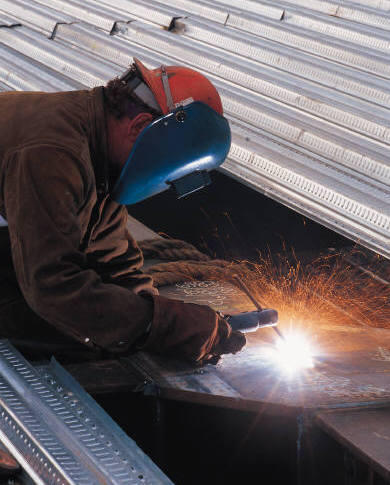Industrial Hygiene
Our principal consultant, Carolyn Wisdom has 30 years experience in industrial hygiene & safety. She is a 'Certified Industrial Hygienist'. Her field experience & technical skills are exceptional. Air quality in industrial settings is one type of industrial hygiene study. Often, air sampling is done to determine if industrial air contaminants, either chemicals or particulates, are in compliance with legal exposure limits.

Common industrial contaminants we can sample in the air :
- metals from welding & soldering
- benzene, toluene, xylene (BTX)
- wood dust
- silica
- paint spray chemicals
- isocyantes
- acids
- asbestos, and many others.

Solvent-based
paints
are typical
industrial
contaminants
Noise
is another type of industrial hygiene study. Noise is measured in the workplace to ensure that workers are not overexposed and that appropriate controls are in place. Excessive noise causes early hearing loss. Go to:
Noise Section
17 Core Competencies for Practice of Industrial/ Occupational Hygiene
The profession of Industrial Hygiene is not well understood by the general public. This profession relates to the preservation of worker health, & the prevention of injury/ disease from workplace exposures & activities. It also relates to community exposures.
- A joint document released in 2012 by the 'Academy of Industrial Hygiene' (based in the U.S.) promotes understanding & identifies 17 "Core Competencies for the Practice of Industrial / Occupational Hygiene"
world-wide. Below are the basic educational proficiencies.
- Basic Science & Mathematics
- Air Sampling & Instrumentation
- Chemical Hazards
- Biohazards
- Biostatistics & Epidemiology
- Community Exposure
- Health Risk Analysis & Communication
- Work Environments & Industry
- Engineering Controls & Ventilation
- Toxicology
- Noise & Hearing Loss Prevention
- Non-Engineering Controls
- Ergonomics
- Managment
- Ionizing Radiation
- Non-Ionizing Radiation
- Thermal Stressors
- This 'Core Competency' document also contains a complete definition of industrial/ occupational hygiene. The document is available from: www.aiha.org
- Professional Industrial Hygienists. According to the Academy of Industrial Hygiene (2012), Occupational Hygienists at the senior professional level must have at least a Bachelor's degree from a accredited College or University with creditable subjects in science, mathematics, engineering, and science-based technology, plus at least four years practice after graduation, followed by a proficiency examination (such as the CIH or ROH). The Academy indicates that 9% of senior industrial hygienists have a doctorate degree.

Questions about Industrial Hygiene?
Are you in compliance with provincial government regulations?
Give us a call!
780-461-5907
780-819-5907 Click




Wisdom Consultants
Edmonton
,
AB
Canada
780-461-5907 (land)
780-819-5907 (cell)
carolyn@wisdomconsultants.com
Copyright 2018 Wisdom Consultants (Environmental Health & Safety). All rights reserved.
info@wisdomconsultants.com Web Hosting by Yahoo! [...]
Edmonton
,
AB
Canada
ph:
780-461-5907
alt:
780-999-5907 cell
carolyn
